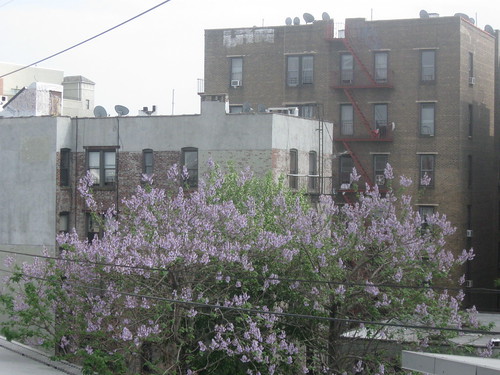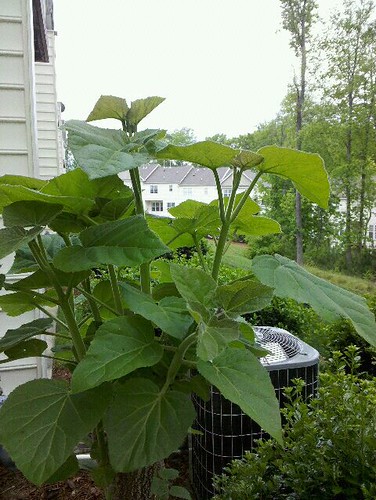Paulownia is a genus of fast growing deciduous trees native to the forests of China. Also known as the Royal Empress Tree, Paulownia tormentosa is often called the fastest growing hardwood tree in the world. Capable of growing 10-20 ft. in 1 year, and of being harvested for timber in 5-7 years, Paulownia trees are a useful tree for permaculturists who are seeking sustainable designs for their gardens, homesteads, and communities.

Paulownia tree blooming in early spring. Courtesy anja
Paulownia trees provide more than wood, though. In early spring, they are covered in numerous, beautiful bundles of purple flowers. These flowers provide nectar and pollen for honey bees and produce a marketable monofloral honey as well.
Paulownia can be coppiced as well as pollarded, and would make a great pioneer support species to use in food forest development. Their quick growth and large nitrogen rich leaves can enrich the surrounding area by building hummus and deepening soils.
These large leaves, up to 20% protein, also make good animal forage for cattle, goats, and other livestock as well.
Paulownia lumber is resistant to rot, though not as much as locust. It is very strong, and also very light. Its quick growth and high insulative value make it an ideal wood for a log cabin or roundwood timber building.
Royal Empress wood is sought after by woodworkers because of its strength, weight, and ease of carving. Guitar makers are especially fond of Paulownia wood.
Because of these attributes and the resulting demand, Paulownia trees demand a high price at timber markets, and offer an opportunity for small farmers to diversify their income streams by using marginable land to produce high quality, quick growing timber.
In a permaculture setting or food forest, Paulownia would guild well with other coppice grove species such as chestnut, hazelnut, and black locust. Its rapid growth and quick rotting leaves make it an excellent choice as a support species to other fruit and nut trees. It would also make fine hugelkulture wood. I envision using Pawlonia trees as both a pioneer species for soil growth, and in a coppice grove area along with smaller fruiting bushes, herbs, and long lived standard trees.

Paulownia tormentosa growing in NY. Courtesy Goosefriend
All of these attributes: rapid growth, high quality timber, prolific flowers, ability to coppice and regrow, along with being able to grow in depleted soils, and a natural resistance to insect and disease pressures, make Paulownia trees (tormentosa, elongata etc.) an extremely useful and valuable plant in the permaculture toolbox.

January 29, 2015 at 10:22 am
Paulownia trees are really neat. I can’t wait to see if they will grow well in Reno where the soil is very alkali and sandy. There’s not much out here, so they don’t have much competition to deal with, but it would be good to have some extra trees growing.
Early Bird Nursery has seeds and roots available. I wish there was more information about their use as livestock fodder. Apparently cattle really prefer it, so it must be tastey for them.